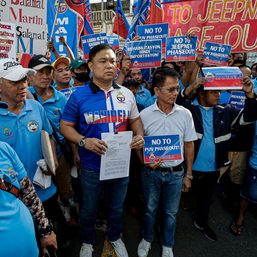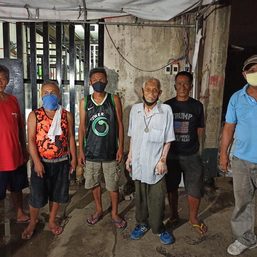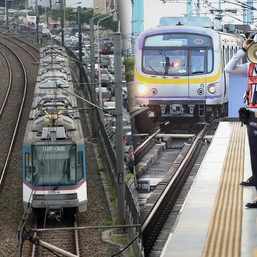SUMMARY
This is AI generated summarization, which may have errors. For context, always refer to the full article.

Transport groups urged the Land Transportation Franchising and Regulatory Board (LTFRB) on Wednesday, May 5, to improve the implementation of the service contracting program, as delayed and inadequate payment problems hound the government initiative.
Drivers under Province of Iloilo Transport Service Cooperative (PITRANSCO), who were supposed to be paid by the government weekly, received their payout in bulk and at the end of their contract in April.
“We didn’t receive payments for almost 4 months since December. We were only paid in April. Plus the kilometers traveled based on their records were not accurate,” said Monica Acha of PITRANSCO in a mix of English and Filipino.
She said drivers had to loan money to make ends meet since their supposed salaries from the government were delayed. She asked for the drivers’ understanding in this regard.
“Di rin nila na-enjoy kasi tamang-tamang lang pambayad sa mga inutang nila. (They didn’t enjoy the money since these were just enough to pay their loans),” she added.
Acha also said there were some instances wherein the initial P4,000 subsidy for drivers was released after the final payout.
The service contracting program was first launched under the Bayanihan to Recover as One Act, also known as Bayanihan 2, to help public utility vehicle (PUV) drivers affected by the pandemic.
Under LTFRB Memorandum Circular (MC) No. 2020-079, drivers of modern jeepneys should be paid P800 a day, while bus drivers should get P1,200, if the threshold for kilometers traveled were met. If not, the kilometer rate – which was amended in April – is at P45.50 for bus drivers and P27 for modern and traditional jeepney drivers.
For inter-regional routes nationwide, the LTFRB simplified the payment scheme based on kilometers traveled. In LTFRB MC 2021-029, the payout for bus drivers is at P82.50 per kilometer, while the payout for jeepney drivers is at P52.50 per kilometer.
Tech glitches?
On inadequate payments, Ernie Cruz, a jeepney driver in Mandaluyong City and chairperson of the National Confederation of Transportworkers’ Union (NCTU), said their association’s treasurer has noted the same problems. Some drivers who drove over 120 kilometers in one day received payouts for around 20 to 25 kilometers only, he said.
Toix Cerna, convener of the commuters group Komyut and member of the Move as One Coalition, said the discrepancy could be attributed to glitches in the GPS tracking, network connection, and incorrect route data that enter the system.
“These are among the things that the LTFRB should address. We’re hoping that it would be solved immediately. There are technological constraints, so the LTFRB should ensure that drivers are paid adequately despite this,” Cerna said in a mix of English and Filipino.
Rappler has reached out to LTFRB Chairman Martin Delgra III for comment, but he has yet to reply as of posting.
Eroding trust
Jaime Aguilar, NCTU secretary-general, asserted that this performance erodes the trust of cooperatives and drivers who believe in modernizing public transportation in the Philippines.
“Sa Batangas, puro reklamo ang nangyari.… Ang karanasan nila hindi nababayaran ng tama. Pangalawa, hindi nake-credit ‘yung kilometrong tinakbo. So instead na ‘yung tao, ‘yung mga transport koop magtiwala, dito nagdadalawang-isip,” Aguilar said.
(In Batangas, there are a lot of complaints. They experienced not being paid adequately. Second, the kilometers traveled was not credited. Instead of the people and transport cooperatives trust them, they are having second thoughts.)
Cruz also lamented the lengthy process of franchise consolidation – the main component of PUV modernization – which now is among the new requirements of the LTFRB to qualify for the service contracting program for intra-regional routes under MC 2021-029 signed on April 16.
Extend budget validity
In a statement, the Move as One Coalition slammed the snail-paced release of payouts and urged lawmakers to extend the validity of Bayanihan 2, which is set to expire at the end of June.
The service contracting program has some P5.58-billion allocation under Bayanihan 2. As of mid-April, Transportation Secretary Arthur Tugade said that only around P40 million has been released, which is less than 1% of the total budget.
The program has P3 billion in the 2021 national budget as well, bringing the total funds to around P8 billion.
“It is unjust that bulk of this billion-peso budget remains unspent while countless transport workers are reduced to begging in the streets as their families go hungry,” Move as One Coalition said.
On May 1, the LTFRB announced a new round of incentives for drivers, in a bid to grow the program’s membership base.
The LTFRB, under MC 2021-030, said that onboarded PUV drivers as of April 30 would get a one-time incentive from the program worth P25,000. Drivers who would be part of the program by end of May would receive a P20,000 incentive.
The MC also included a P7,000 performance incentive for drivers who would log into the system application five times a week.
These are on top of the incentives under LTFRB MC 2020-079, which calculates performance incentives not more than 10% of the net weekly payout.
On April 8, the DOTr said there are over 36,000 drivers that have registered for the program, while another 25,148 drivers have already completed the orientation process.
In its latest report, the Commission on Audit said that the LTFRB only used up around P59 million or 1% of its service contracting funds in 2020.
State auditors said that the intended benefits for contracted drivers were delayed as LTFRB was “behind schedule” in implementation. COA recommended that the regulatory board review the guidelines and simplify the processes of implementing the program. – Rappler.com
Add a comment
How does this make you feel?





There are no comments yet. Add your comment to start the conversation.